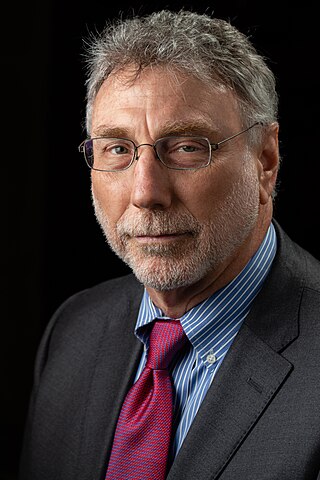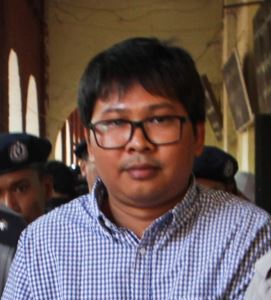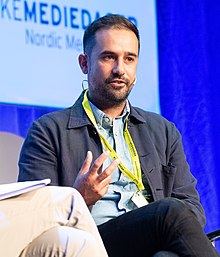
The Medill School of Journalism is the journalism school of Northwestern University. It offers both undergraduate and graduate programs. It frequently ranks as the top school of journalism in the United States. Medill alumni include over 40 Pulitzer Prize laureates, numerous national correspondents for major networks, many well-known reporters, columnists and media executives.

The Pulitzer Prize for Investigative Reporting has been awarded since 1953, under one name or another, for a distinguished example of investigative reporting by an individual or team, presented as a single article or series in a U.S. news publication. It is administered by the Columbia University Graduate School of Journalism in New York City.

Clement Blair Peach was a New Zealand teacher who was killed during an anti-racism demonstration in Southall, London, England. A campaigner and activist against the far right, in April 1979 Peach took part in an Anti-Nazi League demonstration in Southall against a National Front election meeting in the town hall and was hit on the head, probably by a member of the Special Patrol Group (SPG), a specialist unit within the Metropolitan Police Service. He died in hospital that night.

The Center for Public Integrity (CPI) is an American nonprofit investigative journalism organization whose stated mission is "to counter the corrosive effects of inequality by holding powerful interests accountable and equipping the public with knowledge to drive change." It won the 2014 Pulitzer Prize for Investigative Reporting, and in 2023, the Edward R. Murrow Award for General Excellence.
Richard Read is a freelance reporter based in Seattle, where he was a national reporter and bureau chief for the Los Angeles Times from 2019 to 2021. A two-time Pulitzer Prize winner, he was a senior writer and foreign correspondent for The Oregonian, working for the Portland, Oregon newspaper from 1981 to 1986 and 1989 until 2016.
The Territorial Support Group (TSG) is a Met Operations unit of London's Metropolitan Police Service (MPS) which specialises in public order policing, amongst other specialist areas. In 2012 it consisted of 793 officers and 29 support staff. The TSG is a uniformed unit of the MPS that replaced the similarly constituted Special Patrol Group in 1987. TSG units patrol the streets of London in marked police vans or "carriers"; using the call sign prefix "Uniform". Generally each carrier has an advanced (police) driver, six constables, and a sergeant. Territorial Support Groups often comprise three carriers, twenty one constables, and three sergeants reporting to an Inspector. They separately patrol designated areas experiencing serious levels of gang violence or disorder. When deployed, it is by the MPS Information Room. Due to the public order nature of their role, numerous carriers will often be assigned. TSG officers can be identified as TSG from the distinctive "U" in their shoulder numbers. Some TSG officers are also plainclothes officers, carrying a taser and handcuffs.

Martin Baron is an American journalist who was editor of The Washington Post from December 31, 2012, until his retirement on February 28, 2021. He was previously editor of The Boston Globe from 2001 to 2012; during that period, the Globe's coverage of the Boston Catholic sexual abuse scandal earned a Pulitzer Prize.
The Pulitzer Center on Crisis Reporting is an American news media organization established in 2006 that sponsors independent reporting on global issues that other media outlets are less willing or able to undertake on their own. The center's goal is to raise the standard of coverage of international systemic crises and to do so in a way that engages both the broad public and government policy-makers. The organization is based in Washington, D.C.
The Paul Foot Award is an award given for investigative or campaigning journalism, set up by The Guardian and Private Eye in memory of the journalist Paul Foot, who died in 2004.

The 2009 G20 London summit protests occurred in the days around the 2 April 2009 G20 London summit. The summit was the focus of protests from a number of groups over various long-standing and topical issues. These ranged from disquiet over economic policy, anger at the banking system and bankers' remuneration and bonuses, the continued war on terror and concerns over climate change.

Ian Tomlinson was a newspaper vendor who collapsed and died in the City of London after being struck by a police officer during the 2009 G-20 summit protests. After an inquest jury returned a verdict of unlawful killing, the officer, Simon Harwood, was prosecuted for manslaughter. He was found not guilty but was dismissed from the police service for gross misconduct. Following civil proceedings, the Metropolitan Police Service paid Tomlinson's family an undisclosed sum and acknowledged that Harwood's actions had caused Tomlinson's death.

Nicholas Davies is a British investigative journalist, writer, and documentary maker.

Scott Higham is an American investigative journalist and author who documented the corporate and political forces that fueled the opioid epidemic, in addition to conducting other major investigations. He is a five-time Pulitzer Prize finalist and won the Pulitzer twice with his colleagues at The Washington Post. After a 24-year career with The Post, he is now producing investigative projects for Bill Whitaker at 60 Minutes. He is also coauthor of two books.
The Investigative Reporting Workshop (IRW) is an editorially independent newsroom in the American University School of Communication in Washington, D.C. focused on investigative journalism. It pairs students with professional newsrooms to publish projects. It has partnered with dozens of newsrooms on hundreds of investigations, working with over 240 students journalists.
The International Consortium of Investigative Journalists, Inc. (ICIJ), is an independent global network of 280 investigative journalists and over 140 media organizations spanning more than 100 countries. It is based in Washington, D.C., with personnel in Australia, France, Spain, Hungary, Serbia, Belgium and Ireland.

Charles Thomson is a British investigative journalist. He has written for media outlets including The Sun, The Mirror, The Guardian, Mojo, Wax Poetics and the Huffington Post. From 2011 to 2019, he worked at Yellow Advertiser. He is best known for his investigation into the cover up of a historic pedophile ring, for which he won multiple journalism awards.
The Bevins Prize is a British award recognising outstanding investigative journalism. Established in 2008, it is named after the journalist Anthony Bevins and awarded by the Bevins Trust. Also known as the "Rat up a Drainpipe Award", the Prize's trophy is modelled on a drain pipe.

James Ball is a British journalist and author. He has worked for The Grocer, The Guardian, WikiLeaks, BuzzFeed, The New European and The Washington Post and is the author of several books. He is the recipient of several awards for journalism and was a member of The Guardian team that won the Pulitzer Prize for investigative journalism.

Wa Lone is a Reuters journalist and children's author who, with fellow reporter Kyaw Soe Oo, was arrested on 12 December 2017 in Myanmar because of their investigation into the Inn Din massacre. A police witness testified that their arrest was a case of entrapment. It is believed to have been intended to intimidate journalists.












